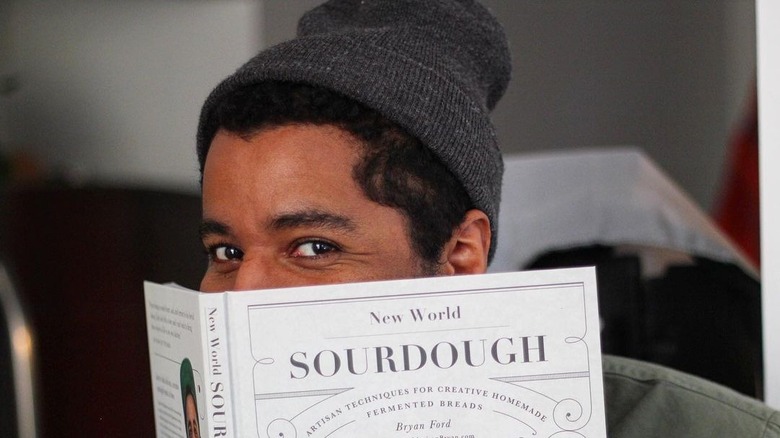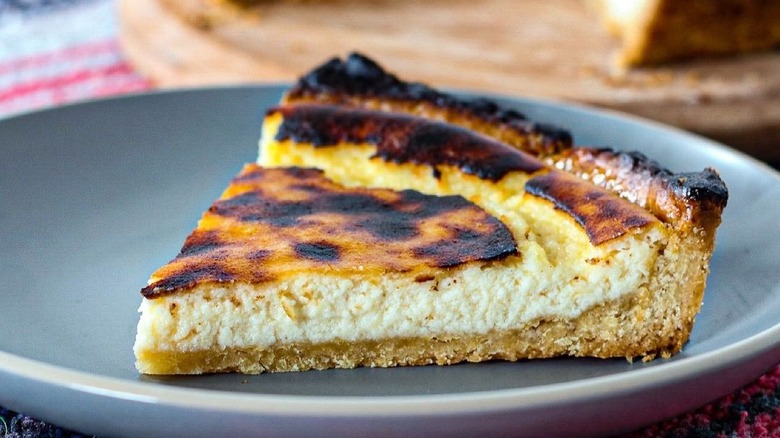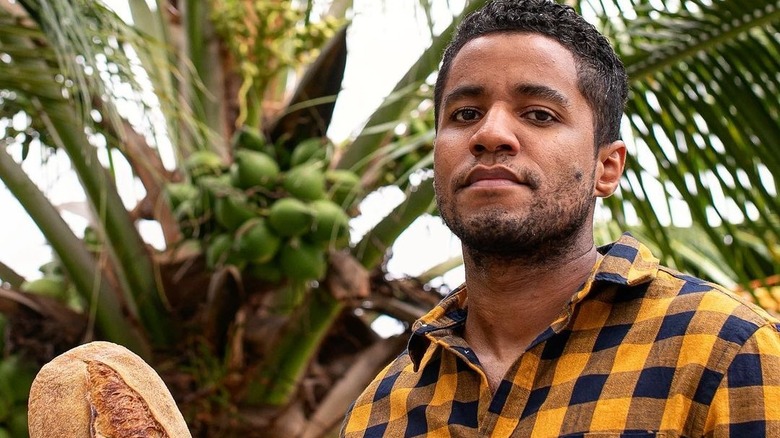The Untold Truth Of Bryan Ford
If you're looking for a gateway to the breads of the world, you'll find it in Bryan Ford. The professional baker, cooking show host, and cookbook author has made it his mission to reveal that the beauty of bread and pastry extends beyond French croissants and baguettes: It has centuries of tradition in Guadalajaran sandwich shops, Colombian pastelerias, and other corners of the world.
Ford shares his experiences as a Bronx-born, New Orleans-based baker with Afro-Honduran roots and general love for bread on many platforms. You can find his first cookbook — "New World Sourdough," published last year — wherever books are sold, watch his upcoming show on Chip and Joana Gaines' Magnolia Network on Discovery Plus, or find many recipes and food pics on his website or Instagram, @artisanbryan. If all of that turns you into a bread nerd, join Ford on Patreon for exclusive sourdough-discard recipes from gingerbread cookies to garlic butter gnocchi.
Ford used to work as a CPA and 'hated it'
Ford wasn't always a professional baker. The now 32-year-old author spent seven years working as an accountant before following his food dreams, according to the Miami New Times. Ford and his friends often held cooking classes and catered dinner parties for sororities and fraternities. Though he found his side business "fulfilling," he carried on with his accounting degree.
After moving to Miami, Ford re-embraced his baking craft, selling bread to small businesses and markets while still working as a certified public accountant (via Miami New Times). In 2018, he quit his job to volunteer at a local bakery. He didn't gain notoriety in the food world overnight — he spent many "long, hard, broke" years "dragging wood-fired ovens around Miami and doing pizza pop-ups to make ends meet," he said on Instagram – but doesn't regret his career change. "If you are on the fence about making the choice between living your dream or being complacent, live the damn dream," he finished the post.
His cookbook is about redefining sourdough
Sourdough, Ford points out in "New World Sourdough," is any type of naturally leavened bread in which fermented flour and water, rather than commercial yeast, cause the loaf to rise and take on that characteristically funky, acidic flavor. As Ford gained experience in the baking world, he realized that the public perception of sourdough was limited to a single style: The crispy, structured loaf with a slashed crust from places like Tartine Bakery in San Francisco.
That leaves other types of sourdough, like Indian dosas and Armenian lavash, out of the conversation, Ford told Food and Wine. "A dense loaf of pan de coco is no less 'sourdough' than a crunchy bâtard with an open, light crumb," he writes. Ford is proud that his book teaches techniques from North, Central, and South America, especially those from his Honduran heritage. "I made a cookbook that not many people would expect from someone who looks like me," he wrote for HuffPost last month. "That's really important to open the door for people to be more proud of the flavors that their culture has to offer and not to get made fun of."
Ford wants baking to feel more approachable
Ford wants baking to be welcoming to all. That's why "New World Sourdough" is an "antidote" to the stressful percentages, temperatures, hydration levels, and other means of perfection that have come to be associated with sourdough, writes Epicurious in its review of the book. While Ford can appreciate the expert "crumb shot" of a Tartine-style loaf of sourdough, he wants home cooks to remember that at the end of the day, baking is about feeding yourself, not about taking a pretty picture (via Food and Wine).
"I can't imagine that, for the thousands of years in which bread has been baked, the end goal of a perfect crumb structure and aesthetics dominated the conversations between the village miller and baker," he writes in his cookbook. To prove his point, the cover of the book shows a loaf of bread that's not sliced precisely in half, but ripped open with his hands, says Food and Wine. If you've ever been intimidated by the nearly lab-grade conversation around bread-baking, Ford's recipes might be the ones for you.
Ford's next cookbook will focus on Latin American baked goods
In his second cookbook, Ford wants to shed light on "the artisanal nature of the way people bake in Latin America," he shares in HuffPost. His previous work is a preview of what might be next. He's shared recipes for his favorite Honduran treat, pan de coco, dense little sourdough coconut rolls to be dipped in a variety of sauces, and has talked a lot about semitas, a brioche-style bread that's topped with crunchy sugar and enjoyed with coffee. On his blog and YouTube, he shares Spanish-language recipes, too, like one for pan Cubano.
While Ford wants to spread awareness and appreciation of Latin American baking, he doesn't want to paint it as something "exotic" or unfamiliar. "It shouldn't be a novelty to make semitas," and it shouldn't be "trendy or cool" to like pan dulce (sweet bread), he writes for HuffPost. "This is just what people make in Latin America."
Ford envisions a more inclusive future of food
Though Ford enjoys croissants, he's tired of seeing them as the dominant offering at most bakeries. "The world is brown and black, if you really think about it, and the world doesn't eat croissants. One country eats croissants. How can we get people to make the bread that represents the world?" he writes in HuffPost, adding that he wants to see breads from Africa, the Middle East, and other parts of the world in future bakeries.
To help bakers of color get a seat at the table, Ford is currently working on Flaky Biscuit Media, which will amplify "diverse voices through stories, recipes, community involvement, and audio/visual projects," according to Instagram. The project, based in New Orleans and New York City, should be live this summer. In the meantime, keep up with @artisanbryan not just for the perfect crumb shots, but also for plenty of puffy pizza, honey buns, and endless uses for sourdough discard.





